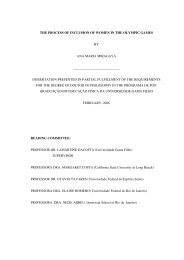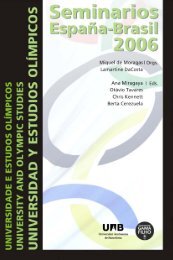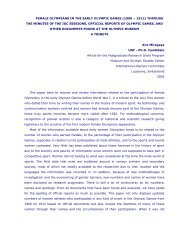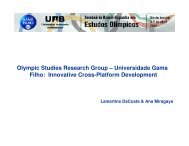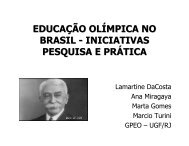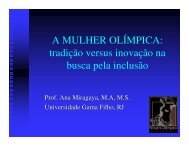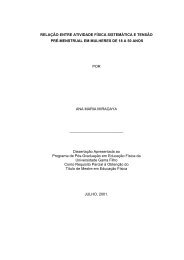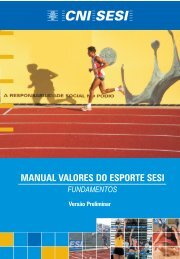- Page 1 and 2: Meio ambiente, esporte, lazer e tur
- Page 3: DIREITOS AUTORAIS E CÓPIAS A prese
- Page 6 and 7: 153 159 171 181 193 195 205 215 219
- Page 8 and 9: 361 375 Ecoturismo: discurso, desej
- Page 10 and 11: 2000 Ana Cristina P. C. de Almeida,
- Page 12 and 13: 2001 Alcyane Marinho DA BUSCA PELA
- Page 14 and 15: exame adicional de características
- Page 16 and 17: dência cultural de colonos alemãe
- Page 18 and 19: 1968 João Lyra Filho publica neste
- Page 20 and 21: ases para emendar a Carta Olímpica
- Page 22 and 23: e Kristine Toohey, da Universidade
- Page 24 and 25: verificação prática de propostas
- Page 26 and 27: de comprovações empíricas e revi
- Page 30 and 31: which began in the early 1990s, foc
- Page 32 and 33: DaCosta, Lamartine. A Atividade des
- Page 34 and 35: INTRODUÇÃO O presente trabalho é
- Page 36 and 37: ficam essas características as con
- Page 38 and 39: prendido pelas vias respiratórias
- Page 40 and 41: mais energia solar que a pele branc
- Page 42 and 43: Portanto, mesmo considerando a comp
- Page 44 and 45: sido comprovado por várias outras
- Page 46 and 47: O esquema de trabalho consistiu em
- Page 48 and 49: A interpretação desses resultados
- Page 50 and 51: Um repasse nos registros de resulta
- Page 52 and 53: processados sob a forma de repetiç
- Page 54 and 55: Aplicou-se o método por 12 semanas
- Page 56 and 57: Excluindo as duas performances dest
- Page 58 and 59: experimentação no local escolhido
- Page 60 and 61: DELGADO DE CARVALHO, esse gradiente
- Page 62 and 63: pelos experimentos. Ficou evidencia
- Page 65 and 66: Ano: 1967 Publicação original: li
- Page 67 and 68: physical preparation does not restr
- Page 69 and 70: Em face dessas circunstâncias, pod
- Page 71 and 72: efeitos da altitude se tornam impor
- Page 73 and 74: coordenação dos movimentos, obser
- Page 75 and 76: altitude. Locais com essas caracter
- Page 77 and 78: Congresso de MACOLIN (Suíça), rea
- Page 79 and 80:
no sentido leste-oeste o impacto da
- Page 81 and 82:
Neste contexto, a ação do treinad
- Page 83 and 84:
1966). Parece, entretanto, haver er
- Page 85 and 86:
[pp. 45-46] PRESSÃO PARCIAL DE OXI
- Page 87 and 88:
maiores alturas de seu habitat, ret
- Page 89 and 90:
mento no que se refere ao fator “
- Page 91 and 92:
O autor deste trabalho teve oportun
- Page 93 and 94:
WINTERBOTTON (Foot-ball Association
- Page 95 and 96:
fadiga que os conduziria a desmaios
- Page 97 and 98:
Ano: 1981 Publicação original: ca
- Page 99:
3. Desenvolvimento Comunitário Ape
- Page 102 and 103:
É só olhar em torno, no nosso dia
- Page 104 and 105:
• estimular as diferentes formas
- Page 106 and 107:
[Fim p. 31 - Continua p. 136] 4.2 L
- Page 108 and 109:
formal, material, eficiente e final
- Page 110 and 111:
ção. Efectivamente, o movimento D
- Page 112 and 113:
Assim sendo, foi-se incorporando à
- Page 114 and 115:
Em 1930, o mesmo Coubertin, ensaiou
- Page 116 and 117:
(7) Cf. Mollet, R. - , Sport Intern
- Page 118 and 119:
enascimento do homem no seu estági
- Page 120 and 121:
obtido quando a Ecosofia aceita o k
- Page 123 and 124:
Ano: 1993 Publicação original: ar
- Page 125 and 126:
número excessivo de turistas, que
- Page 127 and 128:
aías e planícies costeiras) suger
- Page 129 and 130:
os índices de pobreza e marginalid
- Page 131:
no planejamento como na implantaç
- Page 134 and 135:
ções realistas sobre os verdadeir
- Page 136 and 137:
É inegável a participação conju
- Page 138 and 139:
Como sugestão a pesquisas acadêmi
- Page 140 and 141:
mos as grandes avenidas e viadutos
- Page 143 and 144:
Ano: 1996 Publicação original: di
- Page 145 and 146:
etc. Tais questões se assentam em
- Page 147 and 148:
poluídas, com o objetivo específi
- Page 149 and 150:
estética. Ao recortar (ou atravess
- Page 151 and 152:
desconsideram os grandes empreendim
- Page 153 and 154:
Ano: 1997 Publicação original: ca
- Page 155 and 156:
theme, and has prevailed as such in
- Page 157 and 158:
The Editor’s task, with which we
- Page 159 and 160:
Ano: 1997 Publicação original: ca
- Page 161 and 162:
protection as complementary forces
- Page 163 and 164:
This thesis has support in Pausania
- Page 165 and 166:
Olympics. This became the first tim
- Page 167 and 168:
culture. It would be unconceivable
- Page 169 and 170:
The all-inclusive systematic effort
- Page 171 and 172:
Ano: 1999 Publicação original: Re
- Page 173 and 174:
Primeiramente o autor aponta que a
- Page 175 and 176:
ambiente é central para esta defin
- Page 177 and 178:
alguns dogmas desde muito estabelec
- Page 179 and 180:
Maffesoli, uma “mistura de afetos
- Page 181 and 182:
Ano: 1999 Publicação original: Co
- Page 183 and 184:
construiu uma realidade essencialme
- Page 185 and 186:
seja, a compreensão e corporifica
- Page 187 and 188:
Pensar a Educação Física, por es
- Page 189 and 190:
Colocando em foco agora uma outra q
- Page 191:
A interdisciplinaridade deve ser vi
- Page 194 and 195:
da canalizada no interior da trilha
- Page 196 and 197:
vado. Para este autor, a discussão
- Page 198 and 199:
O QUE VEM A SER A RUA DE LAZER? Des
- Page 200 and 201:
A partir da análise das caracterí
- Page 202 and 203:
para aprender a preparar a tinta a
- Page 204 and 205:
Tratando-se da cidade de Tombos, su
- Page 206 and 207:
Partimos da premissa que o Lazer é
- Page 208 and 209:
A excursão a Rio Quente, no estado
- Page 210 and 211:
A grande expectativa da viagem foi
- Page 212 and 213:
Notamos que todos esses ninchos de
- Page 214 and 215:
muita dedicação por parte dos org
- Page 216 and 217:
ções então existentes. Nem a Chi
- Page 219 and 220:
Ano: 2000 Publicação original: li
- Page 221 and 222:
porais e de mudanças de ambiente p
- Page 223 and 224:
se em queda, perdendo o equilíbrio
- Page 225 and 226:
ventos, de suas correntezas. O lúd
- Page 227 and 228:
deste ponto ao cume. [...] Continue
- Page 229 and 230:
contra adversidades, seja de homens
- Page 231 and 232:
A análise dos discursos de pratica
- Page 233 and 234:
Ano: 2000 Publicação original: Di
- Page 235 and 236:
Ano: 2000 Publicação original: ca
- Page 237 and 238:
mente necessários são insuficient
- Page 239 and 240:
pode ser muito valiosa para todos o
- Page 241 and 242:
de uma determinada seqüência, ind
- Page 243 and 244:
sas mentes. Este é o momento para
- Page 245 and 246:
tem um núcleo de profissionais que
- Page 247 and 248:
conhecimento de novas experiências
- Page 249 and 250:
em que o programa de aprofundamento
- Page 251 and 252:
Ano: 2000 Publicação original: Di
- Page 253 and 254:
intangíveis de mensuração e por
- Page 255 and 256:
ambigüidades de algumas questões,
- Page 257 and 258:
azoável (≥ 3,80) e grande (≥ 4
- Page 259 and 260:
momento. A numeração dos itens ap
- Page 261 and 262:
aos especialistas na estipulação
- Page 263 and 264:
E ainda, enfatizaram os possíveis
- Page 265 and 266:
Conforme os especialistas, a perda
- Page 267:
pamentos, surgimento e continuidade
- Page 270 and 271:
Para analisar as propostas dos doce
- Page 272 and 273:
sobre o Meio Ambiente e Desenvolvim
- Page 274 and 275:
disputa ao ponto de exaustão indes
- Page 276 and 277:
CONTEÚDOS DE LAZER E/OU RECREAÇÃ
- Page 278 and 279:
de visitas a espaços e equipamento
- Page 280 and 281:
• Ter como centro a questão antr
- Page 282 and 283:
ALTERAÇÃO DO CONTEÚDO MINISTRADO
- Page 284 and 285:
• Propor aulas práticas e experi
- Page 286 and 287:
salvo em regiões onde há um traba
- Page 288 and 289:
aos profissionais que atuam diretam
- Page 290 and 291:
ido como um estilo de vida e caract
- Page 292 and 293:
quando se almeja mudar a lógica do
- Page 294 and 295:
lazer tornam-se mercadorias, como o
- Page 296 and 297:
privados de um tipo de espaço marc
- Page 298 and 299:
NOTAS 1 Para o funcionalismo, tudo
- Page 300 and 301:
isto porque, o motivo para o sucess
- Page 302 and 303:
Nos escritos de CRATTY (p. 46-47) o
- Page 304 and 305:
MOTIVAÇÃO E FLOW-FEELING A teoria
- Page 306 and 307:
Noutra medida, a cada dois anos, o
- Page 308 and 309:
Brasil, em setembro/outubro de 1997
- Page 310 and 311:
6 Self: Elemento mais importante da
- Page 312 and 313:
desse processo de reciclagem da nat
- Page 314 and 315:
Nessa mesma perspectiva, o discurso
- Page 316 and 317:
e afetivos. Aliás, como são as re
- Page 318 and 319:
ainda timidamente, essas práticas
- Page 321 and 322:
Ano: 2001 Publicação original: di
- Page 323 and 324:
Ano: 2001 Publicação original: an
- Page 325 and 326:
diferença entre o brinquedo popula
- Page 327 and 328:
ções teatrais e de danças. Outro
- Page 329:
CONCLUSÃO Através desta pesquisa,
- Page 332 and 333:
In fact, these options reflect ther
- Page 334 and 335:
governance and ethical behaviour. M
- Page 336 and 337:
are presupposed observers of the Ol
- Page 339 and 340:
Ano: 2001 Publicação original: an
- Page 341 and 342:
1997 a 2003. Justificamos essa deli
- Page 343 and 344:
cotidianas, facilitando a sua compr
- Page 345 and 346:
perativas que permitem aos membros
- Page 347:
é preparar para pensar certo, no s
- Page 350 and 351:
No Brasil, as estimativas da EMBRAT
- Page 352 and 353:
mas e pela subsistência do materia
- Page 354 and 355:
que possa acontecer decorrente do e
- Page 356 and 357:
EQUIPAMENTOS POLIVALENTES GRANDES C
- Page 359 and 360:
Ano: 2002 Publicação original: an
- Page 361 and 362:
Ano: 2002 Publicação original: li
- Page 363 and 364:
Uma visita a espaços naturais, que
- Page 365 and 366:
ou como queiram chamar, leva a uma
- Page 367 and 368:
É necessário que todos os setores
- Page 369 and 370:
grandes saltos, caminhar por espaç
- Page 371 and 372:
CONCLUSÃO A realidade costuma ser
- Page 373:
ções básicas, mas não existe um
- Page 376 and 377:
apresentam a aplicação dos precei
- Page 378 and 379:
instituições, eventos, instalaç
- Page 380 and 381:
Um CON deve modificar os estatutos
- Page 382 and 383:
Algumas questões ajudam a orientar
- Page 384 and 385:
A indústria de produtos e instala
- Page 386 and 387:
A organização dos Jogos contou co
- Page 389 and 390:
Ano: 2002 Publicação original: ca
- Page 391 and 392:
deterministas, mas avança sobre po
- Page 393 and 394:
ecíproca no qual existimos e somos
- Page 395 and 396:
partes. Isto se verifica não apena
- Page 397 and 398:
(...) No campo esportivo também ap
- Page 399 and 400:
Gênero, em seu propósito de super



